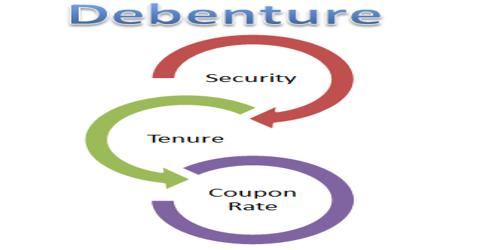Debentures
Debentures are an important instrument for raising long term debt capital. It is a type of debt instrument that is not secured by physical assets or collateral. A company can raise funds through issue of debentures, which bear a fixed rate of interest. The debenture issued by a company is an acknowledgment that the company has borrowed a certain amount of money, which it promises to repay at a future date. Debenture holders are, therefore, termed as creditors of the company. Since debentures have no collateral backing, debentures must rely on the creditworthiness and reputation of the issuer for support.
Debenture holders are paid a fixed stated amount of interest at specified intervals say six months or one year. They are the most common form of long-term loans that can be taken out by a corporation. The loan is issued to corporates based on their reputation at a fixed rate of interest. A company can issue different types of debentures. Issue of Zero Interest Debentures (ZID) which does not carry any explicit rate of interest has also become popular in recent years. The difference between the face value of the debenture and its purchase price is the return to the investor.
Debentures come in two types:
- Convertible debentures: Convertible bonds that can be converted into equity shares of the issuing company after a predetermined period of time. To investors, convertible bonds are more attractive because the bonds can be converted.
- Non-convertible debentures: Standard debentures that can’t be converted into equity shares of the liable company. Since they can’t be converted, they usually have higher interest rates than convertible debentures.
Features of Debentures:
- Debenture holders are the creditors of the company carrying a fixed rate of interest.
- These are instruments of debt, which means that debenture holders become creditors of the company.
- It is redeemed after a fixed period of time.
- These have a fixed rate of interest, and such interest amount is payable yearly or half-yearly
- Debentures may be either secured or unsecured.
- Interest payable on a debenture is a charge against profit and hence it is a tax-deductible expenditure.
- The interest payable to these debenture holders is a charge against the profits of the company.
- Debenture holders do not enjoy any voting rights. This is because they are not instruments of equity, so debenture holders are not owners of the company, only creditors
Advantages
- Investors who want fixed income at lesser risk prefer them.
- It does not carry voting rights, financing through them does not dilute control of equity shareholders on management.
- The company does not involve its profits in a debenture.
Disadvantages
- Each company has a certain borrowing capacity. With the issue of debentures, the capacity of a company to further borrow funds reduces.
- With redeemable debenture, the company has to make provisions for repayment on the specified date, even during periods of financial strain on the company.
- It put a permanent burden on the earnings of a company. Therefore, there is a greater risk when the earnings of the company fluctuate.















